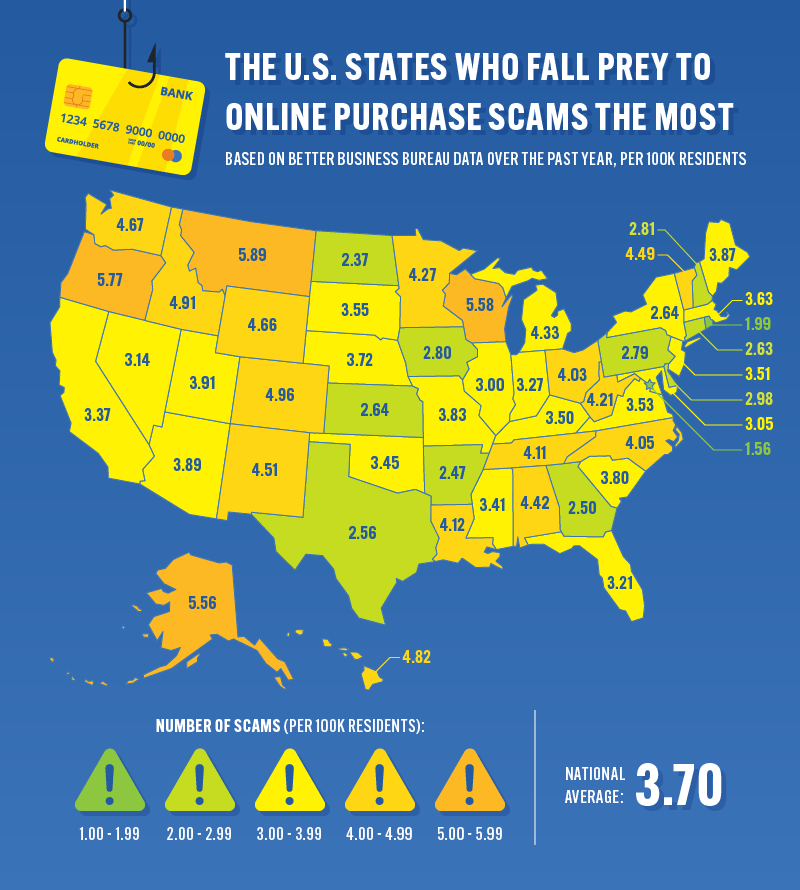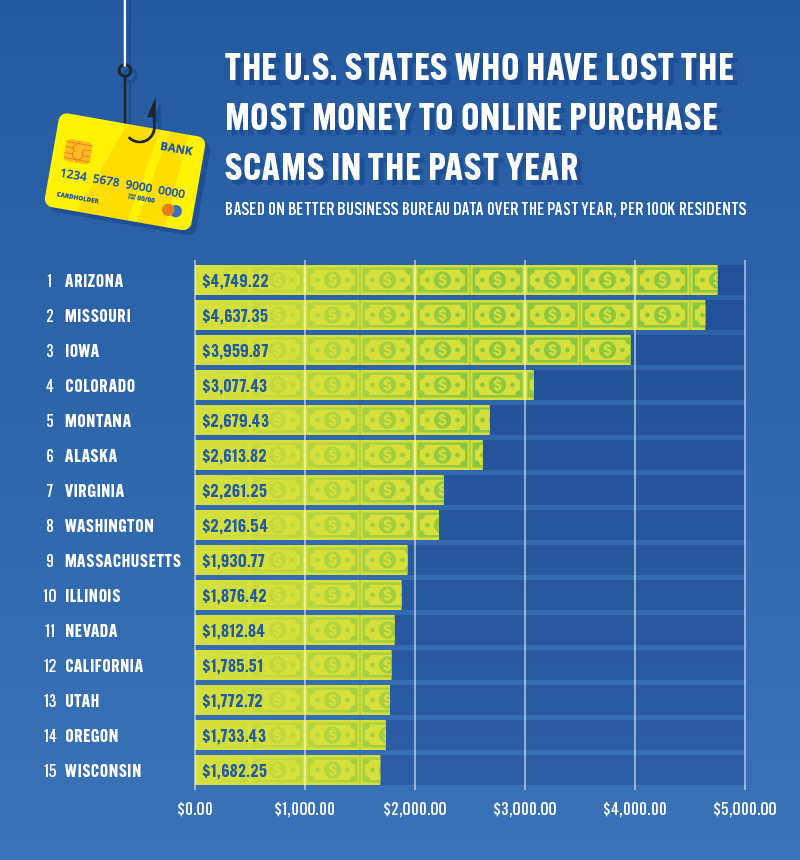
Many Americans have been reluctant to switch to online shopping, and with good reason. Every year, thousands of people wind up losing their money to online purchase scams. Online purchase scams are internet scams where fraudsters pretend to be legitimate businesses, either through a spoofed site or a fake ad on a trustworthy retailer’s site. While scammers sometimes send their victims counterfeit goods, most of the time they just take the money and run.
With everything quickly shifting to online shopping platforms and applications, it’s hard to avoid conducting business over the internet. Online shopping can be convenient, but it’s crucial to stay informed to protect yourself from the latest scams on the web. For this study, the Coventry Direct team looked at which states are more vulnerable to online purchase scams, so online shoppers can better protect themselves during future transactions.
Key Findings
-
- Over the past year, nearly 12,000 Americans have fallen prey to online purchase scams. Additionally, the percentage of online shoppers who lost money as a result of being targeted by internet scams climbed to almost 75% between 2015 and 2021.
- According to the Better Business Bureau, Americans lost more than $5.3 million to online purchase scams in the past 12 months.
- Residents in Montana, Oregon, and Wisconsin experienced more internet scams per capita than residents in other states.
- It’s not all bad; the District of Columbia and Rhode Island reported the fewest online purchase scams over the past 12 months.
Watch Out for Those Online Scammers

Between 2021 and 2022, Montana had the highest rate of online purchase scams. On average, Montanans lost nearly $2,700 per every 100,000 residents. Prior to that, the FBI reported that Montanans lost nearly $380,000 to internet scams alone in 2020. Many losses occurred during the holiday season, where people had to turn to online shopping in response to the pandemic. While it may be the happiest time of the year for many, fraudsters also see it as prime time to run holiday scams that trick people out of their money.
Oregon was a close second to Montana when it came to the frequency of online purchase scams over the past 12 months. One of the most common types of online scams in Oregon is romance scams. Romance scams happen when a criminal uses a fake online identity to gain a person’s love and trust. Once their victim is all in, the scammer will start asking them to send them money or order goods for them online, usually with the promise of a meeting attached. Romance scammers often prey on the most vulnerable; one Oregon widower recently lost $200,000 to an online romance scam. It just goes to show that you have to remain vigilant when it comes to all online encounters.
While scammers will always run rampant on all corners of the globe, there is some good news. Washington, DC, and Rhode Island saw the least amount of action from online purchase scams over the past 12 months. DC reported the fewest online scams per capita and lost the least amount of money over the past year on average. Rhode Island came in as a close second, thanks in part to senior fraud prevention resources provided by the Seven Hills Foundation and other nearby organizations.
Money Lost to Scammers in the U.S.

Over the past year, residents in Arizona lost the most money to online purchase scammers: a whopping $4,749 per 100,000 people. In general, the Grand Canyon state is ripe for online thieves and cybercrime. Arizonans lost $18 million to catfish scams alone in 2021, while others reported losing up to $10,000 to email, text, and phone scams. The Arizona attorney general has provided resources regarding consumer scams to keep citizens informed about the latest scams happening online.
Missouri was a close second, reporting just over $4,600 lost per 100,000 people. Scammers in Missouri have gotten creative with their tactics, going as low as pretending to sell puppies online to would-be victims. While many online purchase scams typically take place on e-commerce websites, not all web scams are the same. Some people will make fake profiles to offer goods for pickup, which is why it is important not to send anyone money before picking up the item for sale.
Closing Thoughts
With retail and commerce quickly finding a new home on the web, it can be challenging to avoid doing business on the internet. Online shopping is quick and convenient, but it’s vital to stay on top of the latest trends to know what tactics scammers will use next.
At Coventry, we are committed to providing seniors with a secure way to turn their life insurance policy into money. If you’re nearing retirement or starting to think about it, our trusted team of policy experts at Coventry Direct can help you sell your life insurance policy. When it comes to your money, don’t trust anything less than the best.
Methodology
To find out which states were more prone to falling for online purchase scams, we calculated the number of online purchase scams reported between September 2021 and 2022. Next, we totaled how much money was lost per capita in each state. All of our calculations were based on the data acquired from the Better Business Bureau.

